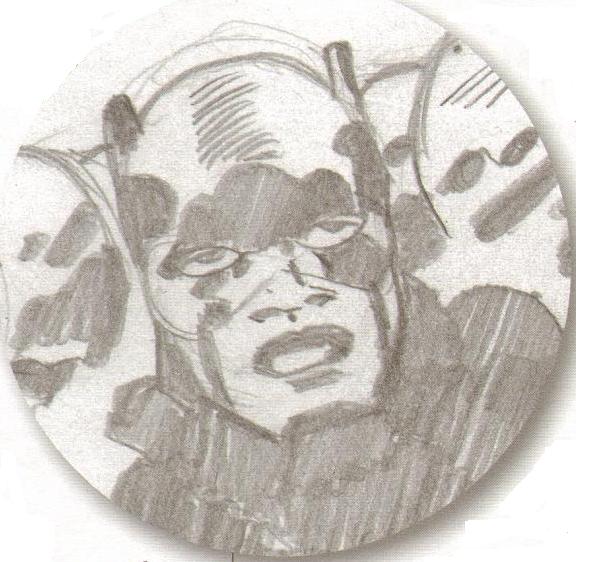The plan was that this would be my last Ken Penders post for awhile, because this is not the All Ken Penders All the Time blog. Sometimes it is the Long Rambling Post About the Past 20 Years of Web Design blog.
However, the post wound up running long, and had a nice natural break in the middle, so now it's going to be two posts. There will be at least one more Penders post after this one.
But while Ken Penders is the focus, these posts aren't just going to be about Ken Penders. I intend to make a few unflattering generalizations about anti-creator fanboys in a minute here, and you may be interested to read them even if you don't care about Penders, Archie, Sega, or Sonic. If you like my posts about creators' rights, this is one of them, and the next one will be too.
So what brought me back to Ken Penders, anyway?
Well, awhile back I was looking at my site stats, and found a referral from a DeviantArt post titled A Summary of ACP Vs. Ken Penders, posted in a group called Save Archie Sonic, which is dedicated to petitioning Archie Comics to bring back all the Penders-created characters that it wrote out of the series. It was a pretty old post by the time I saw it, but at any rate it flatteringly linked to my previous Penders coverage.
And the second comment down, by a guy named CMAugust, had this to say:
The rest of this guy's articles on the subject are great too, well worth reading. On another cool note, this is the same fan who got the first online letter printed in the comic, way back in issue 40.
Holy God, what a thing for somebody to remember after all these years.
Yes, ladies and gentlemen, there you have it: the most obscure and inconsequential piece of Sonic the Hedgehog trivia ever. And it's me.
CMAugust went on to say:
Oh yeah, and if you check out his stories about other comic book people tagged under "creators rights," you'll find that whenever there's a creator vs publisher court case, the fanboys will dump on the creator every time. Sad but true, most fans only care about whether their favorite characters are featured month after month and attack anyone who rocks the boat. No matter who it is.
This is a depressing but entirely accurate observation. I will be coming back to it in my next post.
The third reply down took rather a different and less coherent tack. Somebody posting as THEATOMBOMB035 wrote:
where do we stand? same as last time
Penders is a greedy prick who doesn't deserve the right to even be remembered in the Sonic world after what he is done
he is now a living reason why we exist and why we must stand as are own group of Freedom Fighters
Penders, you are a shame to Sonic fans everywhere
It's the third line that really got me. The part where he compared the fanboys -- the people calling the guy who created or co-created a raft of their favorite characters "a greedy prick" -- to the Freedom Fighters.
And this got me thinking about something I've thought of often before.
The fanboys in these stories -- the ones who insult Jack Kirby's family, or Jerry Siegel's family, or Joe Shuster's family, or Marv Wolfman, or Gary Friedrich, or Jim Starlin, or whoever -- are, invariably, fans of a certain type of fiction. Specifically, these are fans who are extremely passionate about stories where a ragtag band of underdogs strives against impossible odds to defeat an evil empire that is far bigger and more powerful than they are.
And they sure like those stories, but they really don't seem to understand them.
Here is a guy, right here, who looked at Sonic the Hedgehog -- the story of a scrappy band of Freedom Fighters squaring off against an evil empire to regain control of their homeland -- and then looked at Archie v Penders -- the story of a lone cartoonist squaring off against a multi-million-dollar corporation to regain control of his own work -- and thought that in this analogy, the people siding with Archie were the Freedom Fighters.
I just don't get it, man. I don't get how you can be so passionate about a work of fiction while simultaneously failing so utterly to understand its message even a little bit.
Speaking of utterly failing to understand a message, I also found my Penders coverage linked from a comments thread under a piece of fan art called Bunnie's Choice. A user named AlcyoneSong said,
yeah its just sad, because the whole comic has had a reboot due to Penders lawsuit.
And then he linked to my Ken Penders coverage.
My Ken Penders coverage which contains the following passages:
And it is important to remember, throughout this discussion, that while fanboys continue to misstate the basic facts of the case, Archie sued Ken Penders, not the other way around.
and
If Archie does permanently drop Penders's characters and cease reprinting his comics, make no mistake: that's out of spite, not legal obligation. That's not Archie being forced to stop using those works, it's Archie choosing not to use them so it doesn't have to pay Penders for them.
Emphasis in originals.
I mean, for fuck's sake, maybe actually read the thing you're linking to before you describe it.
There was a time in my life where I would probably have gone to the trouble of signing up for a DeviantArt account just so I could argue with year-old posts misstating the basic facts of the case and the content of my posts. Fortunately, I'm past that now, and content to merely criticize them in really long blog posts.
